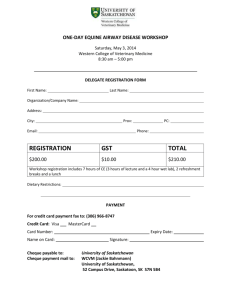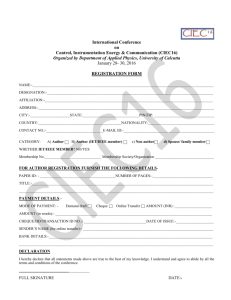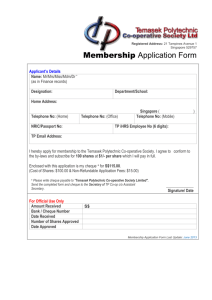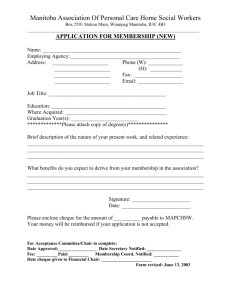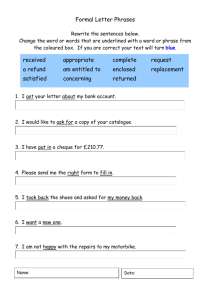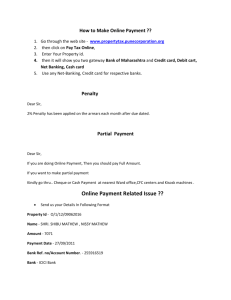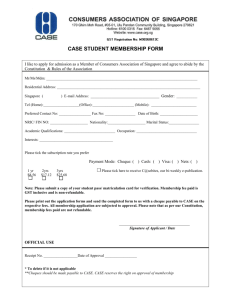a check for cheques
advertisement
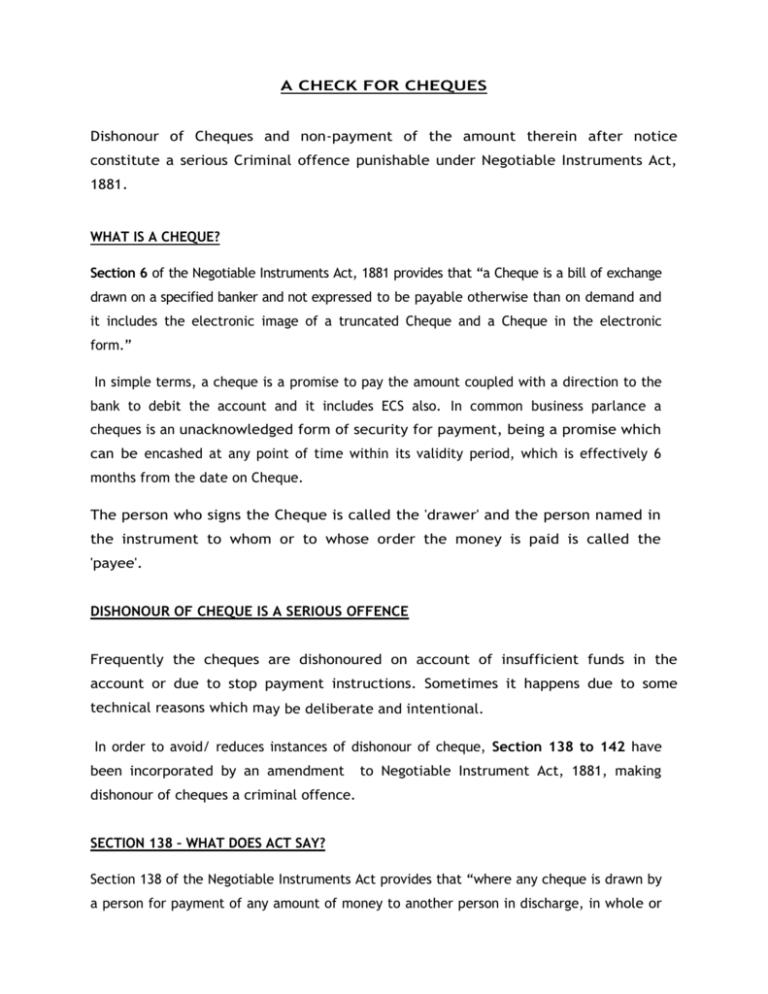
A CHECK FOR CHEQUES Dishonour of Cheques and non-payment of the amount therein after notice constitute a serious Criminal offence punishable under Negotiable Instruments Act, 1881. WHAT IS A CHEQUE? Section 6 of the Negotiable Instruments Act, 1881 provides that “a Cheque is a bill of exchange drawn on a specified banker and not expressed to be payable otherwise than on demand and it includes the electronic image of a truncated Cheque and a Cheque in the electronic form.” In simple terms, a cheque is a promise to pay the amount coupled with a direction to the bank to debit the account and it includes ECS also. In common business parlance a cheques is an unacknowledged form of security for payment, being a promise which can be encashed at any point of time within its validity period, which is effectively 6 months from the date on Cheque. The person who signs the Cheque is called the 'drawer' and the person named in the instrument to whom or to whose order the money is paid is called the 'payee'. DISHONOUR OF CHEQUE IS A SERIOUS OFFENCE Frequently the cheques are dishonoured on account of insufficient funds in the account or due to stop payment instructions. Sometimes it happens due to some technical reasons which m ay be deliberate and intentional. In order to avoid/ reduces instances of dishonour of cheque, Section 138 to 142 have been incorporated by an amendment to Negotiable Instrument Act, 1881, making dishonour of cheques a criminal offence. SECTION 138 – WHAT DOES ACT SAY? Section 138 of the Negotiable Instruments Act provides that “where any cheque is drawn by a person for payment of any amount of money to another person in discharge, in whole or part, of any debt or other liability, is returned by the bank unpaid, either because of the amount of money standing to the credit of that account is insufficient to honour the cheque or that it exceeds the amount arranged to be paid from that account by an agreement made with that bank, such person shall be deemed to have committed an offence and shall be punishable with imprisonment for a term which may be extended to two years or with fine which may extend to twice the amount of cheque.” PREREQUISITE OF SECTION 138 In order to make a person liable for prosecution, the following three conditions must be met – 1. the cheque is presented within its validity (normally 6 months from its date unless it is changed); 2. a demand notice is sent by the Payee to the drawer within 30 days from the Payee's receiving the dishonour instruction from Bank ; 3. the drawer of the cheque fails to make the payment of cheque amount within 15 days of receipt of the notice; 4. complaint is to be made only by the payee or holder in due course and 5. cheque which is dishonoured must be issued for the discharge/payment of a debt or any other liability, which is legally enforceable. Thus, an action cannot be initiated for the dishonour of a cheque that is given as a gift. Courts have expanded the scope of section 138 to apply to situations where the dishonour is for reasons of 'refer to drawer' i.e. where payment is stopped by the drawer; where the drawer has instructed the payee not to present the cheque; or where an account is closed after issuance of the cheque. It is important to note that the offence u/s. 138 is committed only when the cheque is dishonoured and not when it is issued. Therefore, if a drawer issues a post dated cheque and, at the time of its issuance, has no balance in his account, commits no offence if, when the cheque is presented, he arranges for such payment with the bank Further, the Negotiable Instruments (Amendment and Miscellaneous Provisions) Act, 2002 gives discretionary powers to the Courts to take cognizance of a complaint even after one month of the time when the drawer fails to make payment after 15 days of receiving notice. However, in such cases, the complainant will have to satisfy the Court that he had sufficient cause for not making a complaint within such period WHAT IS SPECIAL ABOUT SECTION 138 -142? 1. The most important advantage of Section 138 is the fear of prosecution which entails service of summons and warrants by the police and appearance before a Magistrate as an accused. 2. In case the cheque is issued by a company/ partnership firm, the Chairman/ MD/ Directors, Partners and authorised signatories involved in the transactions can be prosecuted. As Section 141, provides that if the person committing an offence under section 138 is a company, every person who, at the time the offence was committed, was in charge of, and was responsible to the company for the conduct of the business of the company, as well as the company, shall be deemed to be guilty of the offence and shall be liable to be proceeded against and punished accordingly provided he proves that the offence was committed without his knowledge or that he had exercised all due diligence to prevent commission of the offence. Thus, the burden of proof is cast on the concerned officials of the company. 3. Section 138 presumed that the cheque was issued in discharge of a liability. Thus, unlike in a civil case where the Company or a creditor would be required to prove the debt, in a cheque dishonour offence, the drawer of the cheque has to prove that there was no liability on him and explain the reasons for issuing the cheque. 4. Unlike a civil case where the defaulter can appear through his lawyer, in case of a criminal complaint, the accused has to remain present personally in the court unless he gets an exemption from the court. 5. In case a person has filed suits for recovery, then he is not precluded from filing a complaint under Section 138. Similarly, the pendency of criminal matters would not be an impediment to proceeding with the civil suits. WHAT IF PARTY SEEKS MORE TIME TO PAY? In business, goodwill and trust with customers/ dealers etc is very important and sometimes a party may seek time to make the payments. There may be cases where the party may have a good reason to explain the delays which have to be considered due to business compulsions. However, if the party request is not genuine, the question arises what should be done? The answer is that : 1. if the notice has not been sent, the cheque should be represented any time within 6 months from the date on the cheque. 2. If the notice has already been sent, the party should be ask to write with a promise to make the payment on a future date a letter and issue a fresh cheque towards the same. 3. Some additional security in the form of assets can be also asked, but the default must be covered by a fresh cheque from the defaulter. 4. If it is certain that the party is not sincere and is making an excuse, a complaint should be filed and get the process issued. PROCEEDURE FOR INITIATING ACTION 1. Notice should be sent within the statutory period of 30 days from the receipt of the returned cheque along with the return Memo. However, it is not necessary for the payee of a dishonoured cheque to state in the notice that he will take action under Section 138 if the payment is not made within 15 days of receipt of the notice? 2. In case of Limited Companies and Partnership concerns, notice should not only be sent to the Company and/or the Partnership concern but to all the Directors / Partners also. It is advisable to send notices at the residential addresses of the Directors / Partners, as the consequent embarrassment adds to the pressure. 3. In case of proprietary concerns, notice should be addressed to the Proprietor only. For e.g. If the name of the firm is "M/s ABC" and the Proprietor is Mr. X, then the notice should be addressed as "Mr. X, Proprietor of M/s ABC. 4. Notice should be sent preferably by Speed Post with Acknowledgement Due (SPAD) or by Registered Post with Acknowledgement Due (RPAD) if Speed Post facility is not available for the said place. A copy of the notice should also be sent Under Certificate of Posting (UPC). 5. The postal receipt of dispatch should be kept properly attached to the same notice as the proof of dispatch. 6. Whenever the AD card comes back, it should be preserved safely along with the notice. If the AD card does not come back or the AD card is received but there is no signature and/or the date is not clearly legible then a letter should be written to the concerned post office requesting them to give the delivery confirmation receipt. The letter addressed to the post office should be acknowledged by the post office and the same should be followed up with the post office till the delivery certificate is received. 7. The party gets 15 days time to make the payment. During this period it is advisable to follow up with it to put pressure and if it is felt that the party would not pay the dues then preparation must begin for filing of the complaint after expiry of 15 days period. In any case, the complaint has to be filed within 45 days from the date of the receipt of the notice by the Party. In the absence of any confirmation regarding the receipt of the notice in time, the Complaint must be filed within 30 days from the date of the notice to be on the safer side. 8. A cheque cannot be presented after a notice has already been sent to the party. Hence, it is important that case should be filed before the expiry of the above limitation period. However, in case a cheque is dishonoured and a notice has not been sent within stipulated time of 30 days from the date of return memo, then cheque can be presented again within its validity of 6 months and notice can be issued in case of a dishonour. 9. After the complaint is filed, a rigorous follow-up for expediting the case should be done. After filing the complaint in the Court, a verification statement is sworn before the Magistrate and original documents are produced in the Court. Then the Court issues Summons against the accused persons named in the complaint. 10. In case the accused persons do not attend the Court after service of summons, the Court would issue first Bailable Warrant and then Non-Bailable Warrant. 11. Where the accused has been declared absconder and Proclamation u/s 82 has been issued, the Magistrate on being satisfied, can u/s.83 of CrPc , order the attachment property of the accused . However, it may be noted that in such a case of the under Criminal Law, the attached property will vest in the hands of the Government. The complainant does not get the benefit out of the said property. The complainant can only participate in biding for the purchase of the said property if Government decides to sell it. VARIOUS STAGES IN CHEQUE DISHONOUR CASES 1. Notice is given within 30 days from the date of the dishonour of cheque, that is, receipt of return memo from bank. 2. The Party must make the payment within 15 days from the date of receipt of notice. 3. A Complaint must be filed within 45 days from the date of notice if no payment is received with the court having appropriate jurisdiction. 4. No court that is inferior to that of a Metropolitan Magistrate or a Judicial Magistrate of the first class can try any offence u/s 138. All the following Courts will have jurisdiction: The Court, situated at the place where the drawer of the cheque fails to make the payment of money; The Court situated at the place where the bank through whom the cheque was issued, is located; The Court situated at the place where the cheque was issued or delivered 5. Magistrate records Verification Statement of Complainant and examines the documents. 6. Summon is issued against the Accused after verification. 7. Accused appears and furnishes Bail Bond on appearance. 8. Bailable Warrants are issued if the Accused does not appear after summon is served. 9. Non-Bailable Warrants are issued if the Accused does not appear after service of bailable warrants. 10. Proclamation is issued in case the Accused is absconding. 11. Attachment of Properties in the name of Accused in case accused absconds. 12. Plea of Accused is recorded after appearance. 13. Evidence of Complainant by Affidavit after Accused pleads not guilty. 14. Cross Examination of the Complainant. 15. Examination and Cross-Examination of the Defense (Accused) witnesses. 16. Arguments & Judgment
